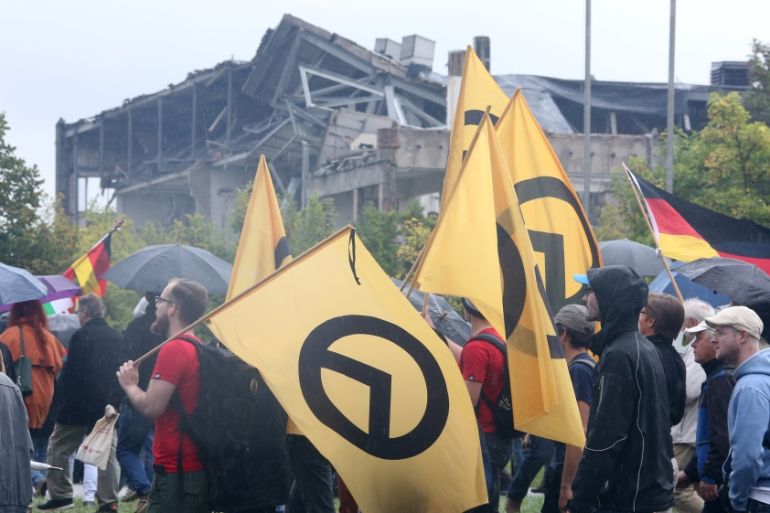Facebook pulls the plug on far-right Generation Identity
Facebook took the decision after the group violated the social media outlet’s policies, according to the i Paper.

The far-right Generation Identity group has been permanently banned from Facebook after violating its policies, according to the i Paper, a UK-based paper and website.
Generation Identity is part of a broader pan-European Identitarian Movement that rallies against refugees and migrants, promotes anti-Muslim sentiment and holds provocative events in several countries.
Keep reading
list of 4 itemsGerman blue-chips warn of ‘extremist’ threat before EU elections
Germany’s Scholz calls for unity against far-right after MEP seriously hurt
‘No turning back’: Carnation Revolution divides Portugal again, 50 years on
Affiliated Facebook pages in the United Kingdom, Ireland, Austria and elsewhere were among those pulled from Facebook, the social media network confirmed to the i Paper on Thursday.
The group is also active in Germany.
Tom Dupre, one of the group’s leaders in the UK, told the i Paper that Generation Identity was “disappointed” Facebook moved to “silence” them.
On Twitter, Generation Identity’s England chapter promoted a petition calling on Facebook to stop “censoring” Phalanx Europa, which sells merchandise for the group.
“Phalanx Europa sells clothing branded for patriots,” the change.org petition reads, demanding that the social media outlet “give individuals the freedom to choose in free market”.
According to Simon Murdoch, a researcher at the UK-based monitor HOPE not hate, Phalanx Europa sells “materials [that] are popular among GI’s supporters and act as a source of funds” for the group.
Facebook’s decision comes just a month after 17 members of the Identitarian Movement, including leading figures, were arrested and hit with a slew of charges in Austria, where the group has a highly active and vocal branch.
Among those charges were forming a criminal organisation, hate speech, property damage and coercion.
Speaking to Al Jazeera, Murdoch said the move could have a detrimental impact on the Identitarian Movement, owing to the Austrian chapter being “key to spreading the movement online through social media” and fostering ties with North American counterparts.
Martin Sellner, who was among those charged in Austria, dismissed the charges as “repressive” at the time.
“The basic claim is that we accused all Muslims of being terrorists, which is, of course, wrong,” he told Al Jazeera, adding that the group is “confident” it will beat the charges.
Targeting refugees
Generation Identity and its activists have repeatedly sparked criticism for their high-profile publicity stunts, such as attempting to interfere with rescue boats aiding refugees and migrants in the Mediterranean Sea in 2017.
More recently, in March, Sellner and other activists were denied entry to the UK while seeking to attend a far-right event in that country.
In April, the movement was widely criticised for attempting to block refugees and migrants from entering France while patrolling the country’s frontiers in the French Alps.
During that incident, around 100 members erected a “symbolic border” and unfurled a banner urging asylum seekers to “go back to your homeland”.
“After symbolically blocking the Col de l’Echelle passage, the convoy has now split up to cover more of the border and locate any migrants trying to enter France illegally,” the group said in a subsequent statement.
“Our continued efforts have shown that it doesn’t take much to patrol this area, and this hasn’t gone unnoticed by the French government.”